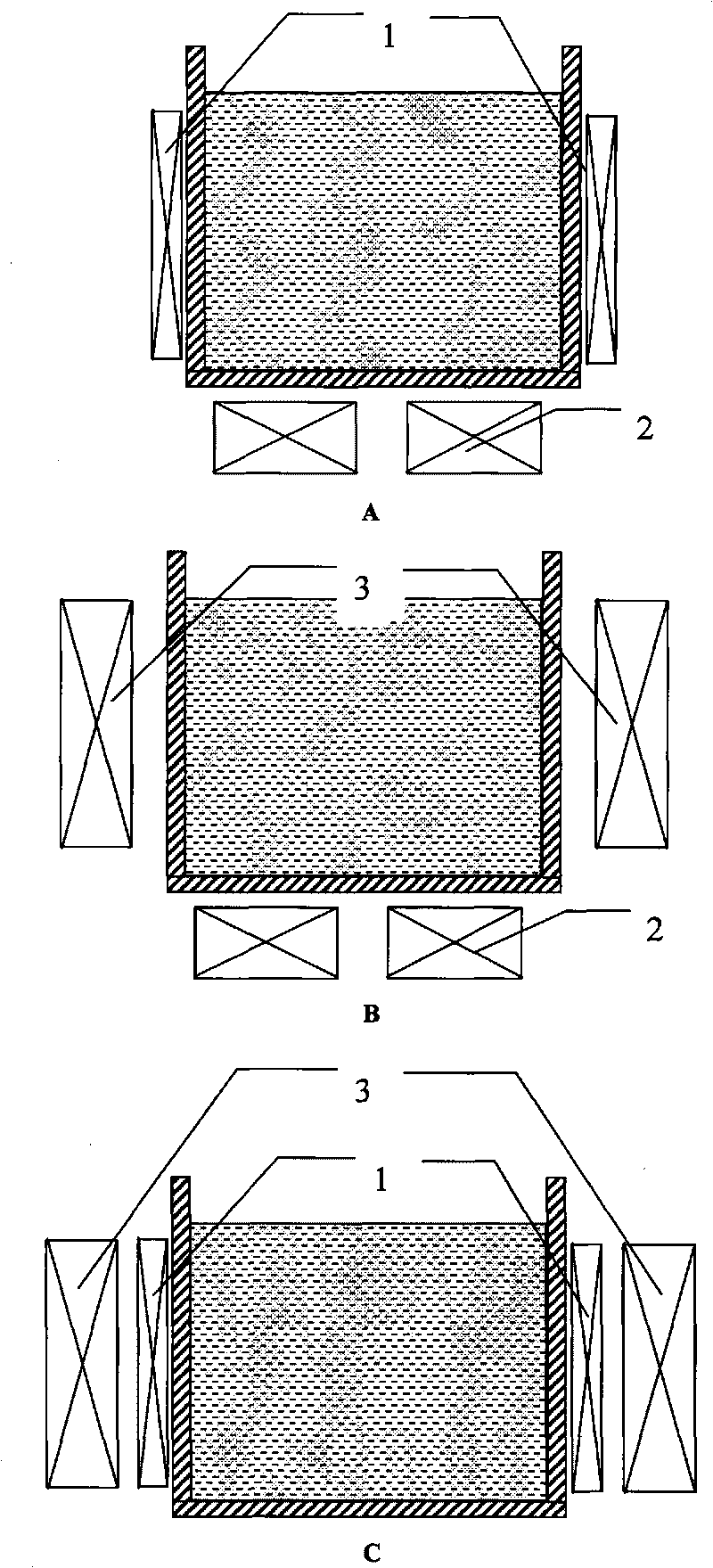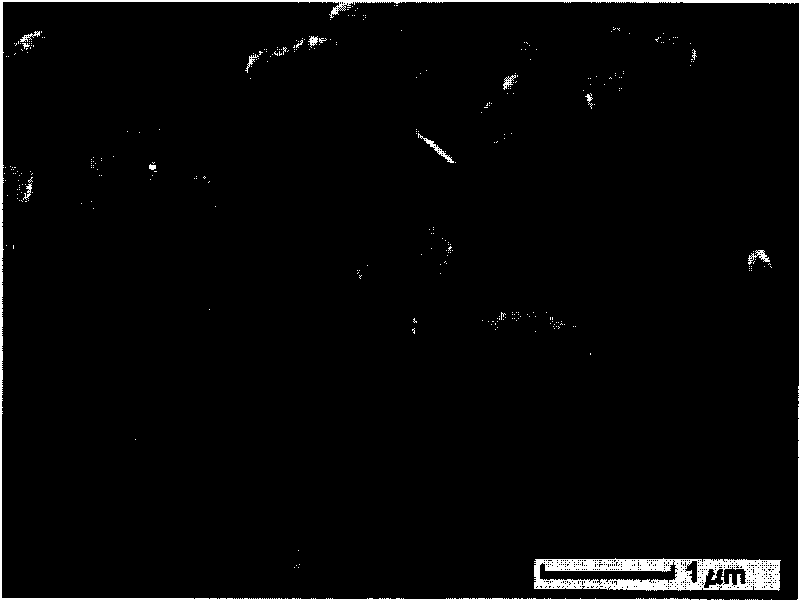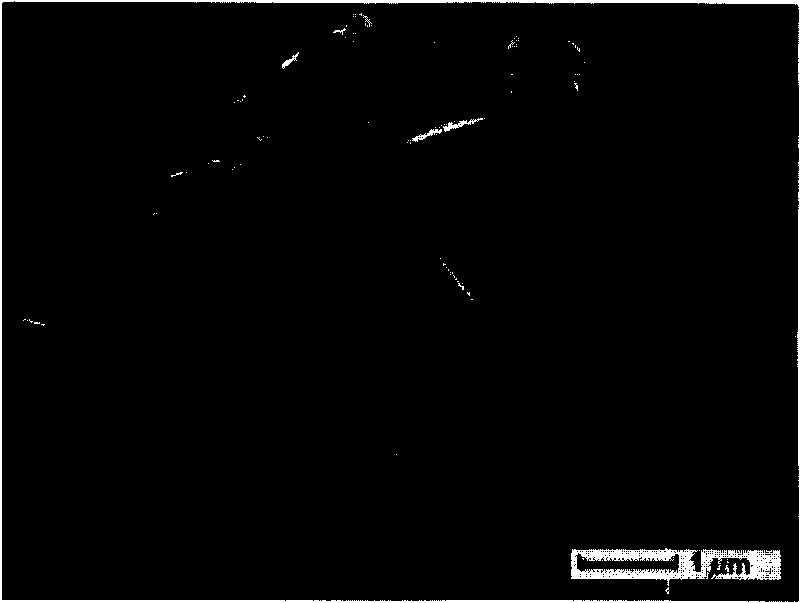Method for synthesizing aluminum-based composite material by multielement magnetic field combined fusant reaction
An aluminum-based composite material and a magnetic field technology, which is applied in the field of melt reaction synthesis of aluminum-based composite materials by using a multi-component combined magnetic field, can solve the problem that the external field cannot be used to accurately control the melt reaction synthesis process, the superposition coupling and the single coupling cannot be achieved. Complementarity and other issues to achieve the effect of shortening synthesis time, increasing rate, and reducing possibility
- Summary
- Abstract
- Description
- Claims
- Application Information
AI Technical Summary
Problems solved by technology
Method used
Image
Examples
Embodiment 1
[0034] Embodiment one: preparation (Al 3 Zr (s) +Al 2 o 3(s)) particle reinforced aluminum matrix composites
[0035] Raw materials: base metal: industrial pure aluminum; solid powder: industrial zirconium carbonate (Zr(CO 3 ) 2 ) powder (purity: 99.20%), refining degassing agent and slag removal agent;
[0036] In situ reaction equation: 7Al (1) +Zr(CO 3 ) 2(s) =Al 3 Zr (s) +2Al 2 o 3(s)
[0037] Particle reinforcement phase: Al 3 Zr (s) and Al 2 o 3(s)
[0038] The preparation process is as follows:
[0039] (1) First metal smelting and powder preparation:
[0040] 10Kg of industrial pure aluminum is melted in a 25kW crucible resistance furnace and heated up to 870°C for degassing and slag removal. All reagents used were fully dried at 250°C to 300°C, among which Zr(CO 3 ) 2 Grind into fine powder (particle size less than 100μm), weighed for later use, Zr(CO 3 ) 2 The added weight is 10% of the metal weight (note: the theoretical volume fraction of th...
Embodiment 2
[0054] Embodiment 2 prepares (Al 3 Zr (s) +ZrB 2(s) ) particle reinforced Al-based composites
[0055] Raw material: base metal: pure Al; reaction salt: K 2 ZrF 6 -KBF 4 (mass fraction ratio 6.2:7.8) mixed salt powder, refining degassing agent and slag removal agent;
[0056] The preparation process is as follows:
[0057] (1) First metal smelting and powder preparation:
[0058] Put 2Kg of pure Al into the crucible, melt it in a 25kW resistance furnace and raise the temperature to 900°C for degassing and slag removal. All reagents used are fully dried at 250°C to 300°C, of which K 2 ZrF 6 -KBF 4 , ground into fine powder (particle size less than 200 mesh), the weight of the mixed salt added is 20% of the weight of the metal.
[0059] (2): Preparation of composite material melt under the combination of multiple magnetic fields:
[0060] If the refining is good and the temperature reaches 900°C, the K 2 ZrF 6 -KBF 4 Press into the molten aluminum in the crucibl...
PUM
| Property | Measurement | Unit |
|---|---|---|
| particle size | aaaaa | aaaaa |
| particle size | aaaaa | aaaaa |
| particle size | aaaaa | aaaaa |
Abstract
Description
Claims
Application Information
 Login to View More
Login to View More - R&D
- Intellectual Property
- Life Sciences
- Materials
- Tech Scout
- Unparalleled Data Quality
- Higher Quality Content
- 60% Fewer Hallucinations
Browse by: Latest US Patents, China's latest patents, Technical Efficacy Thesaurus, Application Domain, Technology Topic, Popular Technical Reports.
© 2025 PatSnap. All rights reserved.Legal|Privacy policy|Modern Slavery Act Transparency Statement|Sitemap|About US| Contact US: help@patsnap.com



